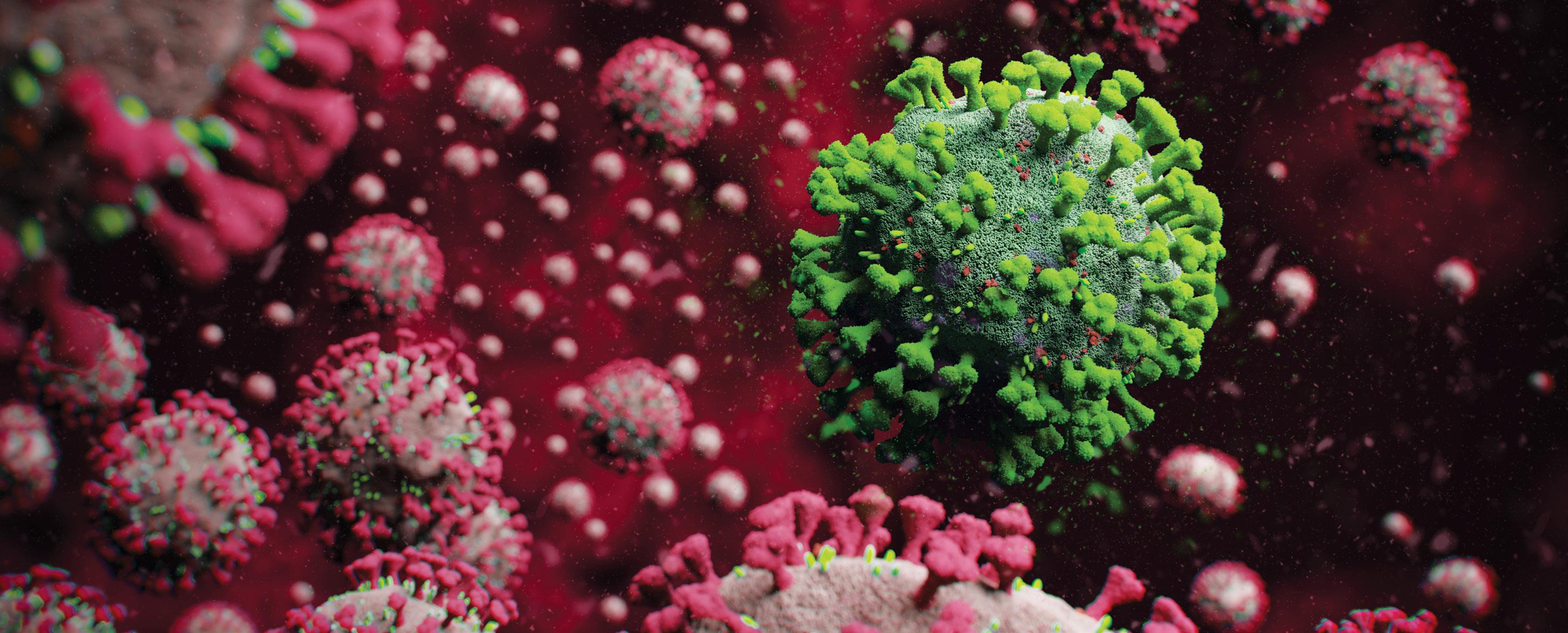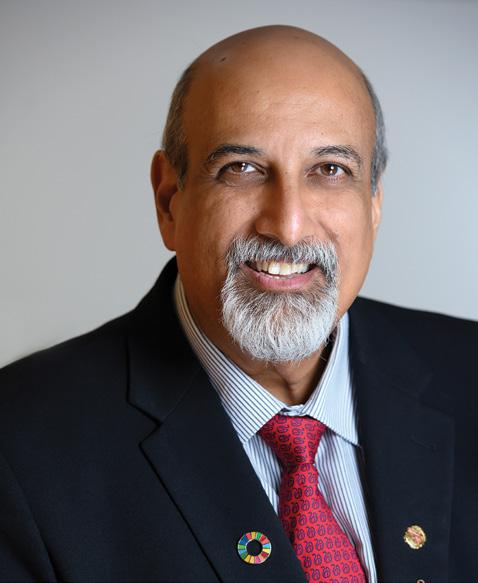
11 minute read
professors
The doctor's newspaper Chronicle MED www.medicalacademic.co.za MAY 2020
Advertisement
Recognition for the discovery that antiretrovirals prevent sexual transmission of HIV, laid the foundations for re-exposure prophylaxis (PrEP).
By Nicky Belseck, medical journalist
WHEN TWO YOUNG graduates began the journey of a lifetime three decades ago, they couldn’t possibly have imagined the medical breakthroughs they’d have, or how their work would come to change the world.
Thirty-two years later dynamic husband and wife duo, Professors Salim and Quarraisha Abdool Karim have been named the 2020 John Dirks Canada Gairdner Global Health Award laureates. Rewarding international excellence in fundamental research that impacts human health, the Canada Gairdner Awards recognise the world’s most creative and accomplished biomedical scientists who are advancing humanity and the world.
The Abdool Karim’s were

recognised “for their discovery that antiretrovirals prevent sexual transmission of HIV, which laid the foundations for pre-exposure prophylaxis (PrEP), the HIV prevention strategy that is contributing to the reduction of HIV infection in Africa and around the world,” the Gairdner Foundation said.
TEAMWORK
“The entire body of knowledge that we’ve been recognised for, comprises our work to find solutions and slow the HIV epidemic in young women,” said Professor Salim Abdool Karim, director of CAPRISA (Centre for the AIDS Programme of Research in SA). “We don't chase the awards,” Professors Quarraisha Abdool Karim (associate scientific director of CAPRISA) SAID. “But it's nice when we do get recognised. Awards like this are an affirmation of the importance of the work
Professor Quarraisha Abdool KarimProfessor Salim Abdool Karim


we're doing. It's also affirmation for the large teams we work with, both scientists within CAPRISA and other health professionals that enable this research.” Salim, or Slim as he is affectionately known (a nickname he picked up in school – ‘Slim’ meaning clever in Afrikaans) agreed. “I think getting an award like this is recognition of the perseverance that it takes to make important medical breakthroughs. They don’t just happen overnight.“But we are merely representatives of a massive team. We have over 400 scientists from across the world working on this problem with us. Just our Durban team is over 200 scientists – we have about 50 PhDs, and 32 medical doctors in our team. That's what it takes to really do impactful research.”
THE WORK
UNAIDS estimates that 37 million people
continued on page 2
The dawn of a new normal
were living with HIV and 1.8 million people acquired HIV in 2017. In Africa, which has over two thirds of all people with HIV, adolescent girls and young women have the highest rates of new HIV infections. ABC (Abstinence, Be faithful, and use Condoms) prevention messages have had little impact – due to gender power imbalances, young women are often unable to successfully negotiate condom use, insist on mutual monogamy, or convince their male partners to have an HIV test.
“In sub-Saharan Africa there’s a disproportionate burden of the global number of infections,” said Quarraisha. “It’s home to about 70% of the global burden of infections. A unique feature and characteristic of this epidemic is that young women acquire the infection 5-7 years before their male peers. There’s a disconnect between what is available to prevent infection that women can use, and where the burden of the infection is. That gap is on women-initiated prevention technologies, which is what we have focused on.” Responding to this crisis, the Abdool Karims started investigating new HIV prevention technologies for women about 30 years ago. After two unsuccessful decades, their perseverance paid off when they provided proof-of-concept that antiretrovirals prevent sexually acquired HIV infection in women. Their ground-breaking CAPRISA 004 trial showed that tenofovir gel prevents both HIV infection and genital herpes. The finding was ranked in the ‘Top 10 Scientific Breakthroughs of 2010’ by the journal, Science, and was heralded by UNAIDS and the World Health Organization (WHO) as one of the most significant scientific breakthroughs in AIDS and provided the first evidence for what is today known as HIV pre-exposure prophylaxis (PrEP).
Presenting the results at the AIDS conference in 2010 the Abdul Karims provoked an emotional response from the audience, expressed in a prolonged standing ovation. “The standing ovation was the first of its kind. We'd never seen something like that,” said Slim. “People just spontaneously stood up, it wasn't orchestrated or anything.”
IN A TIME WHEN the world has changed, and is facing great obstacles, there are many great innovations on the bubble. We celebrate power couple, the Karims, and the incredible work they have done in the field of HIV and PrEP. So many scientists and institutions have stepped up to the challenges that COVID-19 presents.
We focus on the groundbreaking work led by Wits University. We explore the various academic leaders at Wits and their role in confronting corona. There is no denying that this pandemic has changed all of our lives. Virologist
Prof Wolfgang
Preiser of Stellenbosch
“We were stunned,” said Quarraisha. “I mean you see that at rock concerts, at philharmonic orchestra performances, you don't see that at meetings, and definitely not at science meetings. We stood there in awe wondering what to do.”
THE IMPACT
CAPRISA 004 and several clinical trials of oral tenofovir led to the WHO recommending a daily tenofovir-containing pill for PrEP as a standard HIV prevention tool for all those at high risk a few years later. Several African countries are among the 68 countries across all continents that are currently making PrEP available for HIV prevention. The research has played a key role in shaping the local and global response to the HIV epidemic.
“The direct impact is access to technologies that work,” said Quarraisha. The indirect impact is really what’s inspiring in terms of how the communities that have been devastated by this epidemic, have kept their resilience.” “We couldn’t have done any of it without the amazing women that participate in our studies,” said Slim.
PATIENCE, PERSEVERANCE AND PASSION
“Our research was the first to demonstrate that pre-exposure prophylaxes with antiretroviral drugs would prevent sexual transmission. But it took us 18 years before we had a first positive result. And you must admit, after 17 years of failure surely you should move on with your life?” Salim joked. “But it’s that kind of perseverance that’s needed if you are to make major breakthroughs.” Asked how they stayed motivated when result after result was negative Quarraisha said, “Science is not for the faint-hearted. If we had the answer then we wouldn’t need to do any research. These are not simple problems that you’re facing because quite often you’re not trying

Happy reading and stay safe! University and NHLS and Dr Indira Govender discuss the ‘new normal’ under this pandemic. One of the ways that life has changed is the emergence of telemedicine. In recognition of Burns Month, Dr Ethel Andrews, President of the South African Burn Society, looks at the importance of remote wound care.
In the theme of doing things remotely, and virtually, we are excited to be hosting CPD-accredited webinars, starting on 26 May, where Prof Bonga Chiliza will present on schizophrenia. The next webinar will be on 2 June, where Dr Gary Hudson will discuss Obesus Novus: Pandemic on epidemic. Set aside an hour to view these live presentations, from the comfort (and safety) of your home or office. to find solutions for today, it’s solutions for further down the road. Of course, we didn’t know it was going to be 10, 18 years,” she said smiling. “But that’s the joy of science. When you set out to answer questions, you never know what’s going to come out of it. Whether you get a positive or negative result, both send you back to the drawing board to ask why, and both answers help you to move forward.”
“We spend most of our lives proving that we are wrong,” said Slim. “But on occasion when we have been right it's been amazing. We have altered people's understanding of the problem we've altered whole approaches to the problem, and we’re just deeply grateful we were given the opportunity to do that.”
And the journey never ends. “Even when we did get the CAPRISA 004 results we didn't stop and say ahh we got our answer,” said Quarraisha. “We spent the next 10 years trying to understand why we got that answer. That has helped us advance in terms of the questions we're asking today.”
“We hope that our research now, into the future, will be able to develop technologies that will be long acting,” said Slim. “Right now, we’re developing a technology that uses tenofovir in an implant that would last a whole year, that women can use comfortably, and we can get widespread implementation to make a real impact on the HIV epidemic.
COVID-19, REMDESIVIR AND BCG
Of late there’s been a lot of noise made around the use of the BCG vaccination and PrEP medications as potential COVID-19 treatments. “We've said right from the beginning that when you look at this coronavirus, there are very few drugs that work against coronaviruses,” said Slim who chairs the government's advisory committee on coronavirus.
“While I think there's some merit in talking about training the immune system, you can do that with pretty much any vaccine, so it has little to do with BCG. And to believe that somebody who got BCG 40 years ago and somehow that is now protecting them from some disease today – when it doesn't even protect against TB – is a big stretch. I don't really buy it, but I keep an open mind as a scientist, and I’ll say it's an interesting hypothesis. But I need to see better evidence.
“Right from the beginning we said we only know one drug that works against coronaviruses and that's remdesivir,” said Slim. “It just happened that the vice president of Gilead, the drug company that makes remdesivir, was visiting us, in January. She came to spend some time with us in Durban and we talked to her about remdesivir. She said they’d just started discussions with the Chinese government, with the National Institutes of Health, and we're running trial.
“The first results came out on 29 May showing that the drug has some promise. It's the only drug so far that has shown any promise. It's reassuring, but now we need to find something better, that shows impact. Now we must put our shoulders to the wheel and keep working, there are no shortcuts.”
All content in Medical Chronicle is sourced independently and under no circumstances should articles be considered promotional unless specified. NEWS
Global Health Award for SA’s pioneering professors..........................................................1 Wits steps up in face of COVID-19 pandemic............................................................4 NHI: Mistrust in government rife..........7 COVID-19: Dawn of a new normal.........8
PRACTICE MANAGEMENT
COVID-19: Patience and perspective are key...............................................................10
CORPORATE SOCIAL INVESTMENT
Aspen donates 600 electronic devices to medical students ...................................12
ONLINE CPDs
Etifoxine – a unique anxiolytic.............13 How can health workers manage their mental health during COVID-19? .......29 First-trimester preeclampsia screening with biomarkers.................. 44
OPHTHALMOLOGY
Discovery: Important additional function protective eye protein .........14 Rare eye diseases: A glance at Stargardt disease and keratoconus .........................................16
ETHICS
Covid-19: Dealiong with end of life issues ......................................................18
DIABETES
Does size matter? .....................................20
CARDIAC
Controlling hypertension during the COVID-19 pandemic...................................22
SMOKING CESSATION
It is never too early or too late to stop smoking ................................................24
DIABETES CPD
Insulin regiments in type 2 diabetes.26 Diabetes and fasting ................................36
WOUND CARE
Remote wound care during COVID-19 ......................................................34
RESPIRATORY
COVID-19 pneumonia procalcitonin for risk assessment..........................................28
RHEUMATOLOGY
Gout vs OA: Clash of the arthritic titans .............................................30
PAIN
Therapeutic protocols for COVID-19 in SA ............................................32 Ibuprofen can be used for COVID-19 symptoms ................................41
GASTROENTEROLOGY
Medical vs surgical treatment for refractory heartburn ...............................33 Bowel Prep education app is effective .....................................................38 Probiotic reduces crying in colicky infants........................................ 40 Crohn’s marker improves outcomes ........................................................42
WOMEN'S HEALTH
Does exercise ease dysmenorrhoea?........................................45
OPINION
The challenge facing SA with the second wave of COVID-19 ............46
PLACEBO
Retinal cryoprobe celebrated on South African Mint's newest collectable coin............................................47 CPD
In partnership with In acknowledgement of World Schizophrenia Day, Medical Chronicle will be hosting a free CPD-accredited 1-hour webinar on this topic. Join Prof Bonga Chiliza, president of the South African Society of Psychiatrists, who will present on this condition and give us an update on the biology and new trends.
CPD ACCREDITED You are invited
Medical Chronicle Schizophrenia Webinar

Tuesday, 26 May 2020 Time: 10am Topic: Schizophrenia
Bonga Chiliza is an Associate Professor/Chief Specialist and Head of the Department of Psychiatry at the University of KwaZulu-Natal. He completed his medical degree and psychiatry specialisation at the University of KwaZulu-Natal and his PhD at Stellenbosch University. His research interests include schizophrenia, consultation-liaison psychiatry, health services and medical education. He is the president of the South African Society of Psychiatrists, as well as the deputy editor of the South African Journal of Psychiatry. Prof Chiliza has received several awards including the Hamilton Naki Clinical Research Fellowship and the South African Health Excellence Award. He has authored over 60 peer reviewed articles and book chapters. He has also served on a number of NGO Boards, including the SA YMCA and Life Choices. He is one of the Founding Directors of Harambee Medical Consulting and the Africa Global Mental Health Institute.

Presenter: Prof Boga Chiliza, President of SASOP
Dr. Reddy’s










